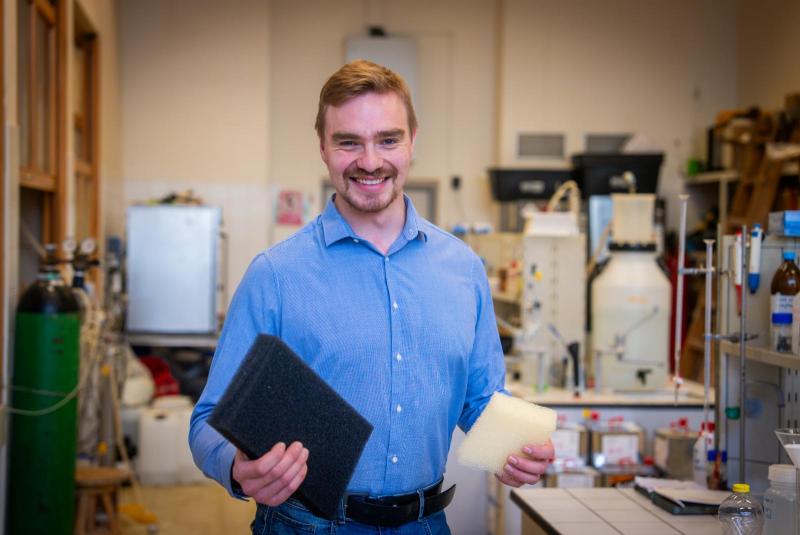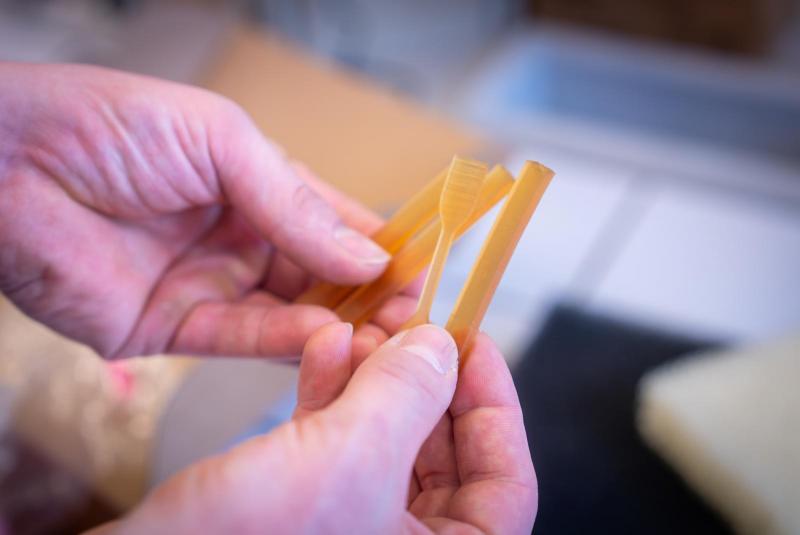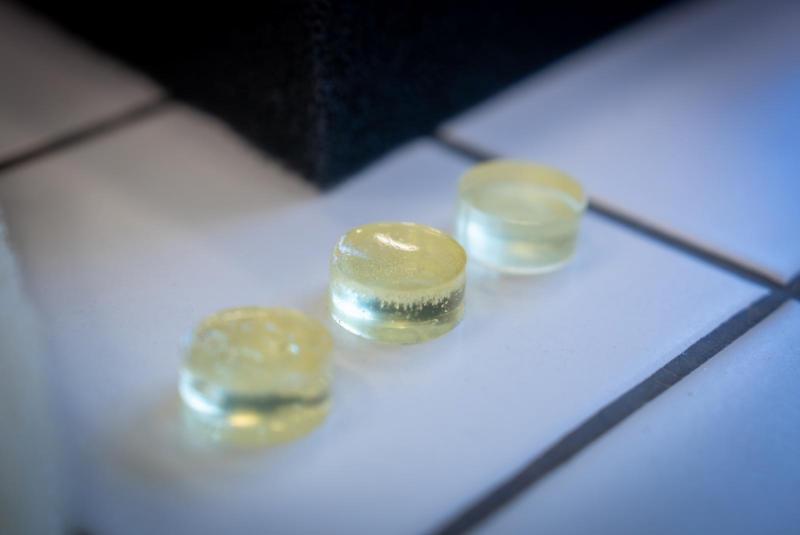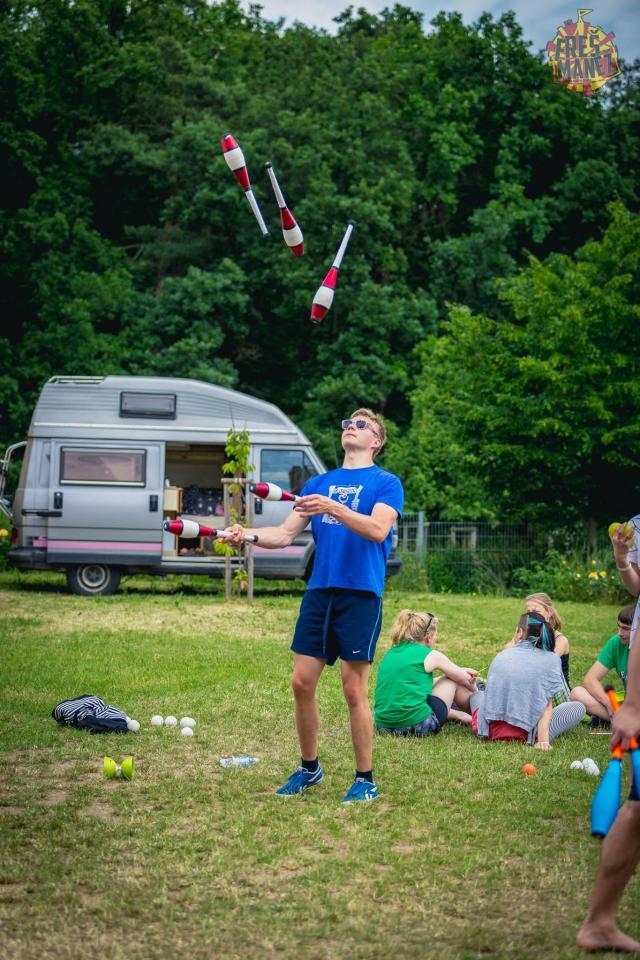What do science and juggling have in common? Both require patience, says Vojtěch Jašek, who focuses on research in chemical recycling
Doctoral student Vojtěch Jašek from the Institute of Materials Chemistry at the Faculty of Chemistry, Brno University of Technology, focuses in his dissertation on developing materials from renewable sources and chemical recycling. His research, which includes applications in the automotive industry, 3D printing, and construction, has the potential to offer more eco-friendly alternatives. He was recently nominated for the prestigious Jean-Marie Lehn Prize for Chemistry. Beyond science, he also enjoys juggling—a skill that helps him train his patience not only in the lab. In the interview, he shared his thoughts on the nomination, his personal motivation for research, and the societal impact of his work.

During my PhD studies, I’ve been working on multiple projects. The longer I’ve been in the programme, the more topics I’ve incorporated into my work. The largest part of my dissertation focuses on the development of materials from natural sources, such as plant oils and biopolyesters. These materials are alternatives to petroleum-based products and are used in a wide range of applications. Over time, I’ve also included topics like waste valorization and chemical recycling. Besides various material applications, my dissertation is also focused on the synthesis of light-curable coatings.
What societal impact does your research have?
For some people, this topic may be attractive due to their values and interest in having a more positive ecological impact. Research into alternatives to petroleum-based sources can contribute to sustainability and reducing dependence on non-renewable resources. The most promising field for me is chemical recycling and waste valorization, which helps find new uses for materials that would otherwise end up in landfills or be incinerated. This direction, which I find deeply meaningful, has played a key role in my internal motivation. I also believe it's a very timely topic—both in terms of European legislation and global developments.

Over time, chemistry has become a part of my life that I’ve developed a strong connection to and that truly fulfills me. I’m also motivated by the variety in research—it's never routine. So I’d say that, and my love for chemistry.
What has been the biggest challenge?
The biggest challenge for me has been the long periods when I had a vision but couldn’t see immediate results. Sometimes it takes months or even years to reach a result in the form and quality I’m aiming for. The first thing that helps overcome these challenges is patience. The second is working on other projects that can fill the gap of a temporary failure and bring new energy. If you keep working toward your main goal while also making progress on smaller tasks, those successes can give you the motivation and drive to complete even the more difficult parts.
What led you to study chemistry at the Faculty of Chemistry?
What I liked about chemistry is that it combines natural sciences with a technical aspect. At a career fair, I noticed the Faculty of Chemistry—partly because my brother and father both studied at BUT and because it’s a technical university. I saw it as more practical and industry-oriented than other universities, which made the most sense to me at the time. It all came together into a mix that worked well for me.

Every day in the lab is different, depending on the stage of the research. But it often starts with washing glassware (laughs). Chemists spend a lot of time maintaining a clean working environment. Research work involves planning, preparing experiments, carrying out chemical reactions, and processing the results.
I usually arrive at the lab, think through my daily plan, and schedule my time to use it as efficiently as possible. If a reaction takes several hours, I analyze results or prepare other experiments in the meantime. Some processes require waiting, so part of the work shifts to the next day.
What key skills does a successful chemical researcher need?
Patience, 100%. That’s probably the one trait you absolutely need. Most experiments don’t work the first time—maybe not even the fifteenth. It's important to have internal motivation and maintain a positive relationship with the field.
Another key trait, in my opinion, is openness. In research, you often work with people from different backgrounds and perspectives. When you let go of your stubbornness and view things from a different angle, you can find new solutions. Being persistent is helpful, but as they say—everything in moderation. Life works best in balance.
What does the nomination for the Jean-Marie Lehn Prize for Chemistry mean to you?
I’m pleased that my work has gained attention and that others see it as meaningful. I personally find a lot of meaning in it, but I understand that others might not consider this topic very important. So I’m genuinely happy that my research was impactful enough to represent our faculty in the competition.
What motivated you to apply, and how would you use the prize if you won?
My supervisor suggested I apply, and I decided to go for it since my dissertation already had well-developed results. I was also genuinely curious about what other PhD students are working on and what their research ambitions are. I found all the presented projects very inspiring—many of them are even more interesting than mine (laughs).
At the same time, participating in the competition also has external motivation in the form of a financial reward and prestige. I’ve never been on a research stay in France, but I’d consider applying to a university focused on materials chemistry. I’d invest the financial reward.
Are you planning a scientific career, or are you drawn to industry?
Honestly, my career goals have shifted significantly during my PhD. Initially, I was aiming for a position in industry, perhaps as a research team leader, combining expertise with a varied workload. In my third year, I did an internship at BASF, where I worked on chemical recycling of polyurethane foam materials for the automotive industry. That experience, along with other industry internships and our research’s focus on recycling and valorization, made me realize that academic research offers a broader range of topics and greater variability. So now I’m considering staying in academia.

Personally, I find chemical recycling the most exciting research endeavour. To use an analogy: imagine a company produces 100 tons of waste each year and doesn’t know what to do with it. They come to me as a researcher, I have unlimited time and the best ideas, and I manage to transform 100% of that waste into raw materials that can go back into production—closing the recycling loop. That makes the most sense to me in terms of sustainability and scientific skill.
However, chemical recycling has its downsides, such as high energy demands and high costs. There are always trade-offs—nothing is black and white. For example, plastic bags are cheap to make and easy to recycle, but they’re often used once and discarded. Paper packaging is an alternative, but its production consumes more material, water, and energy. Ideally, we wouldn’t use bags at all—but if we do, then a reusable plastic one, and only switch to paper when it’s truly necessary.
How do you relax?
I’m a very social person, so I enjoy spending time with friends, my girlfriend, and family—whether that’s going for a walk or sharing good food or drinks. I also enjoy floorball and strength sports. I like offline life. Until I was 15, I lived mostly online, playing computer games, but since high school, I’d rather head to the park with friends and juggle some balls.
Juggling has been a big part of my life. I used to go to day camps in Lužánky, where I joined the LeGrando circus, which had a great group of people. Juggling and science have one thing in common—patience. Juggling definitely helped me develop that. When you’re juggling, you spend hours picking up balls from the ground (laughs). And science is very similar in that way.
Do you have a scientific role model?
My biggest life inspiration is my dad. Professionally, it’s my colleague and friend from the faculty, Silvestr Figalla. We’ve been working together since my bachelor’s thesis, and beyond being an incredibly talented chemist, he’s shown me how to look at problems from many different angles.
Thank you for the interview, and we wish you continued success!
-jo-
| Published | |
|---|---|
| Link | https://www.fch.vut.cz/en//f96620/d285955 |